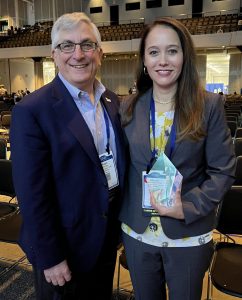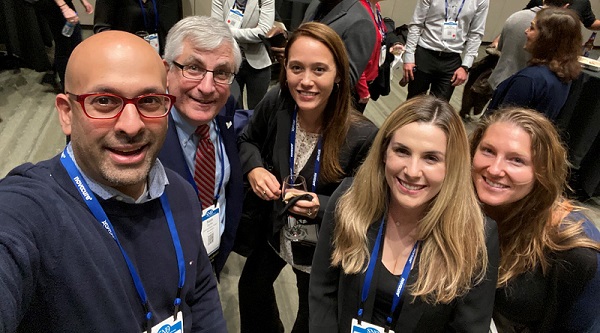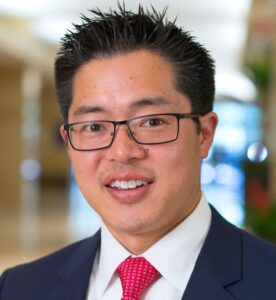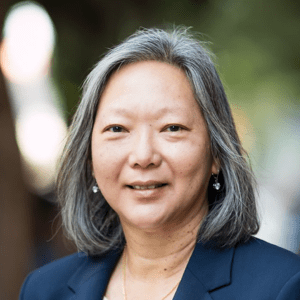The Society for Neuro-Oncology (SNO) kicked off its Annual Meeting in Boston this past November. Among those attending in person were several ABTA staff members, including President and CEO Ralph DeVitto and Chief Mission Officer Nicole Willmarth, PhD.

The occasion was extra special for Nicole, who was honored with the 2021 Jan Esenwein Public Service Award for her significant contributions to the field of neuro-oncology research.
“I was so surprised. Being recognized in this way is such an incredible honor, and to be able to accept it in person at SNO was wonderful,” Nicole said.
Nicole directs and leads the ABTA’s Mission department, which is responsible for patient and caregiver education and support programs, as well as the ABTA’s entire Research program.
Each year, through ABTA services, thousands of patients, survivors, and caregivers get the information and resources they need to navigate their brain tumor journey.
Since joining the ABTA in 2015, Nicole has provided oversight in awarding more than $6.4 million across 132 research projects and fostered the first collaborative team science research grant at the ABTA.
The award Nicole received at the Annual Meeting honors Jan Esenwein, who served as SNO’s Chief Administrative Officer from its inception in 1995 until her passing a few years ago.
Remembered for her unwavering commitment to the organization’s success, Nicole says this award is a reminder of all who help to advance brain tumor research.
“I felt like I was accepting this award on behalf of all the incredible people that I get to work with, from ABTA staff to leaders in the field of neuro-oncology, researchers, patient advocacy groups, and brain tumor patients and caregivers who are going through this journey,” Nicole said.
The meeting offered invaluable opportunities for early-career investigators to network with more senior researchers in neuro-oncology. Nicole says early-career investigators were excited to learn about ABTA research grants and the ABTA Alumni Research Network (AARN).


“It’s critical to support these early-career investigators because they’re bringing those innovative, outside-of-the-box ideas to the field,” Nicole said.
Nicole says sustaining innovative research is ever-important, especially for malignant brain tumors and metastatic brain tumors.
“Research in brain tumors has been lagging behind other cancer areas, which makes it even more critical that we have more advancements,” she said.
According to the National Institutes of Health (NIH), estimated funding for brain cancer research in 2022 will be approximately $404 million, just a tiny fraction of the $7.4 billion allocated for cancer research.
Nicole says she’s optimistic as the eligibility criteria for those who can participate in clinical trials are widened for patients with brain metastases.
“We’re learning a lot about diagnosing metastatic brain tumors and different effective treatments besides whole-brain radiation, such as immunotherapies or targeted therapies,” she said.
Nicole noted several forward-looking presentations at the meeting, including the future of artificial intelligence in neuro-oncology and the use of liquid biopsies in detection and monitoring progression of brain tumors.
Nicole says she looks forward to the new year bringing more collaborative and multi-disciplinary research opportunities.
Read more about the latest ABTA grant recipients and explore other grant opportunities on our website.

Jessie Schlacks
Jessie is Managing Editor of the bi-monthly e-newsletter MindMatters. Submit story ideas or questions to jschlacks@abta.org.




















